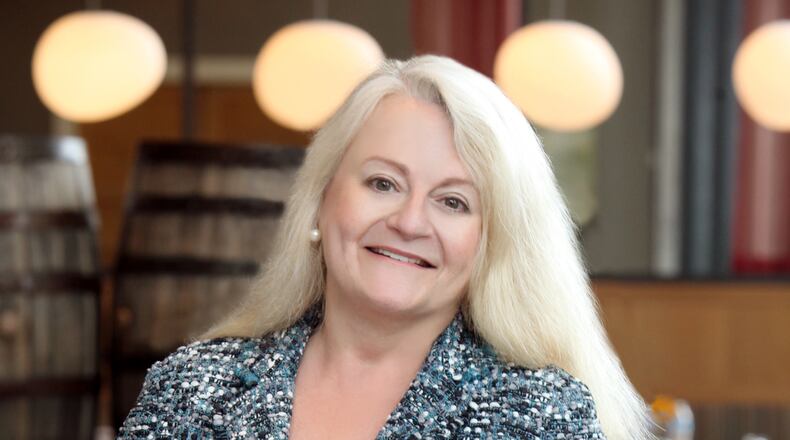Karen Bremer keeps a small plaque on her desk that says, “Only those who see the invisible can do the impossible.”
Bremer picked it up a few years ago at a bookstore. “It said so much to me about faith and hope,” she said.
It’s also a succinct way to describe Bremer’s more than 45 years in the restaurant and hospitality business, from her first job at 15 as a clerk at an S&S Cafeteria to her current role as president and CEO of the Georgia Restaurant Association.
“This industry is like theater,” she said. “There are some things you want people to see, and everything that goes into it, it’s not their problem.”
In January, Bremer will retire after 14 years heading the GRA. Current board Chair Stephanie Fischer will assume her position.
Credit: Courtesy of Karen Bremer
Credit: Courtesy of Karen Bremer
Bremer moved to Atlanta in the early 1980s, looking to make a change.
“I wanted to shift into fine dining,” she said. “It resonated more with me, in terms of coming from a traditional European family. My mother was very formal.” Placemats and linen napkins were part of every meal, Bremer recalled.
She soon found her longtime home at local restaurant group Peasant Restaurants. Founded by Steve Nygren and Richard Dailey, the group included popular eateries Mick’s, Dailey’s, Pleasant Peasant and Peasant Uptown, and provided Bremer with a diverse workplace where she joined several other women in leadership roles.
Her time at Peasant, where she eventually became president, laid the groundwork for her future work in advocacy, as well as her emphasis on connecting with the area served by a restaurant.
“Steve was an amazing leader,” she said. “He really had an understanding of the relationship between his restaurants and his community, and how a restaurant takes from a community, so therefore it has an obligation to give back.”
In 2000, Bremer bought two former Peasant restaurants, Dailey’s and City Grill, and had a successful run as a restaurateur, instituting perks for her employees that were unusual at the time, including sick pay, 401(k)s and insurance benefits. She was forced to close the properties in 2009, a victim of the Great Recession.
Bremer was dejected by the closures, but it wasn’t long before she was pulled back into the restaurant industry. She had dabbled in restaurant advocacy years earlier as part of the Georgia Hospitality and Travel Association, and also had worked in the early 2000s on pushing for a federal worker visa program and a path to citizenship for immigrants who had been in the country for a long time.
Credit: Courtesy of Karen Bremer
Credit: Courtesy of Karen Bremer
She was instrumental in starting the current iteration of the GRA in 2003, along with Atlanta restaurateurs Pano Karatassos Sr. of the Buckhead Life Restaurant Group and George McKerrow of Ted’s Montana Grill.
Still, it took some convincing when the GRA board chair encouraged her to apply for the president’s job after her restaurants closed.
Although she never had thought of doing anything other than running restaurants, she said she realized that the GRA position would give her the opportunity to marry several different skills she’d developed over her years in the industry.
In her first year at the GRA, she said, “the organization was in terrible financial shape and didn’t have a good reputation with restaurants, and I had no clout at the Capitol.”
Bremer chipped away at the organization’s finances and learned how to be a lobbyist by visiting the Capitol every day, getting to know state and local politicians and familiarizing herself with the laws.
She spearheaded efforts to pass the Brunch Bill, enabling restaurants to start selling alcohol earlier on Sundays, and a bill that allowed restaurants to choose what types of energy they can use on their property.
When the pandemic brought the restaurant industry to its knees, Bremer mobilized the GRA to lobby for passage of the Cocktails to Go bill, worked with Gov. Brian Kemp and the Georgia Department of Public Health in creating reopening rules for dining establishments and pushed for Georgia to treat Paycheck Protection Program loans and Restaurant Revitalization Funds as nontaxable income.
“In my career, I’ve been through seven recessions, tornadoes, hurricanes, the AIDS crisis, foodborne illness crises,” she said. “I told my team at the beginning of COVID that our mission was to ensure that no restaurant would go out of business in the state of Georgia, that we would do everything in our power to help people make it through.”
While the industry still struggles in some areas, she has high hopes. According to the Bureau of Labor Statistics, there are almost 22,000 restaurants operating in Georgia, an increase of nearly 3,000 from 2019. And although Bremer sees some challenges ahead — primarily the depletion of the labor force — she said she’s heartened by the positive changes she has seen over the years.
Her storied career recently was recognized with the creation of the Karen Bremer Executive-in-Residence for Hospitality Leadership position at Georgia State University’s Cecil B. Day School of Hospitality, which will allow her to continue mentoring women in the restaurant industry.
And, Bremer has a simple piece of advice for her successor at the GRA. “Never, never lose sight of how important the industry is to our workforce and to our communities,” she said. “Restaurants are the souls of our communities. It’s our modern-day meeting house.”
Sign up for the AJC Food and Dining Newsletter
Read more stories like this by liking Atlanta Restaurant Scene on Facebook, following @ATLDiningNews on Twitter and @ajcdining on Instagram.
About the Author
The Latest
Featured




